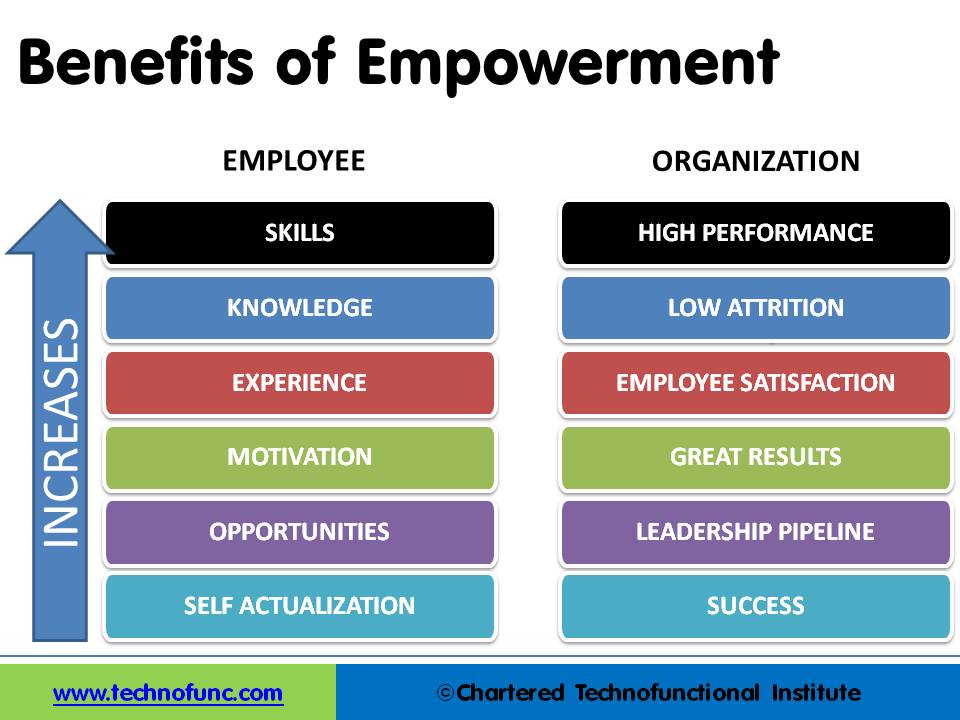- Home
- Business Processes
- Industry Knowledge
- Aerospace Industry
- Automotive Industry
- Banking Domain
- BFSI Industry
- Consumer/ FMCG Industry
- Chemicals Industry
- Engineering & Construction
- Energy Industry
- Education Domain
- Finance Domain
- Hospitality Domain
- Healthcare Industry
- Insurance Domain
- Retail Industry
- Travel and Tourism Domain
- Telecom Industry
- Leadership Skills
- eLearning
- Home
- Leadership
- Team Leadership
- Benefits of Empowerment
Benefits of Empowerment
Teams are certainly very relevant and important elements in today’s high-performance organization but the important thing to remember as a leader is that we can’t simply rely on putting highly effective individuals together to make a highly effective team. Empowerment increases the effectiveness of the team and drives many intangible benefits both for the organization and the employees.
Effective teams often require the right mix of people, skills, resources, and a focus on building good working relationships. Empowering your team members allows leaders to utilize the skills, knowledge, experience and motivation of their entire talent base. Let’s understand how to empower your team members to achieve great wins!
What is Empowerment?
Empowerment is the authority or power given to someone to do something. Empowerment refers to the delegation of some authority and responsibility to employees and involving them in the decision-making process, not in mere job activities, but rather at all the levels of management. Empowered employees develop loyalty and trust and they are proud to be working for the company and are eager to contribute to company success. People can be “empowered” to make decisions at work. They can be “empowered” to speak up with new ideas. Employees can also be “empowered” to act when the integrity of the organization is at stake.
Benefits to the Employee
Empowerment provides new opportunities to your team members to develop and stretch beyond their current capabilities and acquire new skills. It helps in increasing their motivation level, creates new opportunities to develop their leadership skills and satisfy their self-actualization needs. Empowered employees have increased self-confidence, are keen to develop their own skills, and also to find ways to make use of those skills to the company's benefit.
It brings a sense of ownership to the employee due to which he personalizes the goals and objectives of the organization and associates his success with his own abilities. Also, the performance of the employee improves as he attaches self-induced rewards with his performance by making decisions pertaining to the problem and sees the results (success) that follow.

Benefits to the Organization
On the other hand, it brings immense benefits to the organization and to the project or the program. Performance increases, people feel more satisfied and there is low attrition. You can achieve great results and exposure builds the leadership pipeline for your organization. Empowerment is all about mutual success where everyone wins.
Empowerment increases the organization’s responsiveness towards the problems or issues. Also, there is an increase in the productivity of an employee as he is completely engaged with the firm and takes decisions for the betterment of the organization as a whole. The benefits are numerous and well-documented — happier, more productive employees, a higher level of engagement, enhanced customer service, reduced stress, increased innovation, more pride and loyalty, less stagnancy, and an organization that is more adaptable to change. Plus, it just makes the workplace more pleasant for everyone.
Empowering your team is not difficult, but it does require a conscious effort. A tremendous shift in thinking is required by both leaders and professionals to make empowerment work.
Related Links
You May Also Like
-
Authentic leadership is an approach to leadership that emphasizes building the leader's legitimacy through honest relationships with followers which value their input and are built on an ethical foundation. The authentic leader acts upon his or her values and beliefs, and inspires others to do the same, is committed to know and develop oneself. Are you committed to developing yourself; know your motivations and the purpose of your leadership? Read this article to know more about authentic leadership style and discovering your authentic self.
-
Collaborative leadership is all about collaborative problem-solving and decision-making or can also be defined as the leadership of a collaborative effort. . The term started to appear in the mid-1990s in response to the formation of long term public-private partnerships to rebuild public infrastructure. Learn how you can use principles of collaborative leadership to enhance your leadership skills for being an effective leader.
-
In its simplest sense, decision-making is the act of choosing between two or more courses of action. Decision making is a key skill in the workplace and is particularly important if you want to be an effective leader. When decisions have to be made, there are several stages that you should go through to reach a practical solution. Understand the meaning and importance of decision making and how to look at it as a process.
-
This style is characterized by leaders making decisions for others and expecting followers to follow instructions. The directive leader is adept at giving instructions, setting expectations, and establishing timelines and performance standards. However, it is possible for the same leaders to display both directive and supportive behavior as per the demands of the situation.
-
Facilitative Leadership is all about involving the employees in the decision-making process at all levels enhancing their sense of ownership, responsibility, and motivation. Facilitative leadership style uses a number of indirect communication patterns to help the group reach consensus and build commitment for the decision taken. To be effective in modern organizations, managers need to become facilitative leaders, learn what it means to be a one.
-
In today's innovation-driven economy, understanding how to generate great ideas has become an urgent managerial priority. Managers need to encourage and champion ideas and need to help their organizations incorporate diverse perspectives, which spur creative insights and facilitate creative collaboration by harnessing new technologies. Innovation is the embodiment, combination, and/or synthesis of knowledge in original, relevant, valued new products, processes, or services.
-
Recognizing Stress & its Sources
As an individual, you almost certainly know what stress feels like. Stressors are events or situations to which people must adjust. Stressors may be physical or psychological in nature. The level of severity of stress is determined not merely by exposure but the intensity, duration, and frequency of stressors. The sources of stress are many. They arise from multiple areas both with the individual and from the environment.
-
“Level 5 Leadership”, this term was coined by Jim Collins in his book “Good to Great” and it is all about achieving "Greatness" as a leader. This article will explain what we mean by Level 5 Leadership and what the characteristics of a Level 5 leader are. What it takes to achieve greatness as a leader, and what are the steps and strategies that one can use to move up to this top level of leadership.
-
Teams are certainly very relevant and important elements in today’s high-performance organization but the important thing to remember as a leader is that we can’t simply rely on putting highly effective individuals together to make a highly effective team. Empowerment increases the effectiveness of the team and drives many intangible benefits both for the organization and the employees.
-
A manager or an employee in an organization who is experiencing a high level of stress may develop high blood pressure, ulcers, irritability, difficulty in making routine decisions, loss of appetite, accident proneness, and the like. These can be subsumed under three general categories, physiological, psychological, and behavioral symptoms. Stress can give rise to a number of changes.
Explore Our Free Training Articles or
Sign Up to Start With Our eLearning Courses

About Us
Learning
© 2023 TechnoFunc, All Rights Reserved










